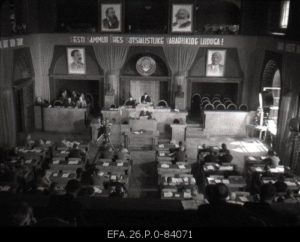The article was published on 29.05.2018 in the The Baltic Times.
Toomas Hiio, Research Director of the Estonian Institute of Historical Memory
The passing of 200 years since the birth of Karl Marx (1818–1883) was celebrated in the city of Trier, Germany on 4 and 5 May 2018. The President of the European Commission personally honoured the festivities with his presence. The People’s Republic of China presented Trier with a larger than life statue of Marx. The city of Trier announced that this is the year of Karl Marx. Several exhibitions have been opened, and podium discussions and conferences are being held. “A multifaceted artistic, cultural and scientific programme invites visitors to consider Karl Marx and his oeuvre from different viewpoints,” is written on the city’s website.[1]
The city of Trier has the right to remember the 200th anniversary of Karl Marx’s birth and to harness it in the interest of promoting tourism. Other cities where the founders and promoters of other totalitarian ideologies were born also continue to bear the burden of their renowned fellow citizens. They do so in different ways. Consider Gori in Georgia and Linz in Austria, Wuppertal in Germany and Predappio in Italy, or Ulyanovsk in Russia and Shaoshan in China.
Even Estonia had its Kingissepp for 36 years, where Viktor Kingissepp, the martyr of Estonian communists, was born. This city is once again Kuressaare already for over a quarter of a century. At the same time as Kuressaare was renamed Kingissepp, Chemnitz became Karl-Marx-Stadt. That city is again Chemnitz and has been so for quite some time. The President of the European Commission would probably not honour memorial events in any one of those cities, but if he were to, then perhaps only Shaoshan in December of this year, when 125 years will have passed since the birth of Mao Zedong. World politics above all. Yet from the standpoint of the memory of millions of innocent human victims from the 20th century, these are different forms of expression of one thing. The 125th anniversary of the birth of Alfred Rosenberg in January of this year was not commemorated in Tallinn. No conferences were held and no exhibitions were opened. It was actually simply forgotten and that is how it should be. What does Rosenberg have to do with Marx in any case? Both were first and foremost ideologues in the clutches of their utopias. The actual implementation of his utopia simply took Rosenberg to the gallows.
It cannot be denied: Marx sells. Although he died in the 19th century, he is one of the most influential thinkers who affected the fates of 20th century nations and peoples in Europe as well as in Asia, Africa and Latin America. It is another question whether the contribution made to European history by Marx and his friend Friedrich Engels, along with other thinkers and politicians motivated by their utopias, deserves to be honoured and followed.
It is a fact that Marxist political movements established dictatorships of the proletariat when they attained undivided power and that these regimes are guilty of the murder, killing and execution of tens of millions of innocent people. The reason for this was often simply because Marxist ideology’s vision of the future of the world did not see any place for these people in that world of the future. Regardless of Marxist criticism of capitalism and its prediction that capitalist polity would soon collapse and be replaced by socialist society, this has never happened even once in any country with a developed economy over the course of the past century.
Let us leave aside the post-World War II export of revolution with the support of the Red Army’s bayonets. The semblance created by propaganda – the “successful building of socialism” after World War II – which fascinated millions of young people in the countries of Europe and North America who defied the society of their parents, to say nothing of anti-colonialist liberation movements in developing countries of Asia, Africa and Latin America, ultimately proved to be a sham and fell apart. Western young people who spent their youth studying the dogmas of Marx, Engels, Lenin, Mao and their lesser disciples have mostly become respectable burghers, who still brighten up when they recall the times of their youth, as is usually the case when people reminisce about their youthful follies. Asia, Africa and Latin America were not as lucky. Marxists, Leninists and other communist guerrillas seized power in many countries and replaced one dictatorship with another. Some of them persisted for quite a long time thanks to their important geographical location in the conflict between East and West and to generous support from the Eastern Bloc conditioned by the needs of that conflict.
Chaos, humanitarian catastrophes and the status of failed states followed the collapse of the Eastern Bloc. Some peoples fared better but they do not have Marxist ideology to thank for that.
Why were people in Estonia and elsewhere vociferously outraged when it became known that the President of the European Commission was planning to personally honour the memory of Karl Marx with his presence in Trier?
Every politician knows that utopian and resounding ideas are not enough. The people want to see results. Freedom was only an appearance, and living conditions did not improve, unlike those countries and peoples, the polities of which Marxist ideology declared would soon disappear.
Revolutionary momentum soon petered out. Massacres, building up, the promise of communism, stagnation and degeneration followed. Communism was replaced by advanced socialism and even more slogans. If this was socialism, then no socialist at all wanted to live in it. Communists did not succeed in waiting long enough to be able to experience communism.
Unlike Western Europe’s middle aged people and their parents, who remember only the ideology of world reform but have not witnessed its implementation, the experience of their Estonian and Eastern European contemporaries is more complete. Here in Estonia, ideology and slogans that did not stand the test of time are remembered much better because they were inculcated into people here at every stage of education from kindergarten to doctoral studies.
We remember because those slogans in white lettering and always on red backgrounds adorned buildings in our city centres and the compulsory demonstrations (if schoolchildren did not attend these, they had to explain why to school administrators) in the slushy greyness of 7 November and the greyness of spring that had yet to sprout on 1 May, alongside pictures of Marx, Engels and Lenin, and a host of other dead or still living classics of theory and practice, depending on the need to adapt the ideology.

Estonia’s independence was liquidated under Marx’s portrait. Photo: Estonian National Archives
We remember because compulsion and ever intensifying imbecility was associated with those slogans and pictures, including Marx. Ever more witty anecdotes about these great leaders and how their one and only true teaching did not hold true were the only relief for this imbecility. Relief also came in the form of products from degenerating capitalism, the quality of which the planned economy never attained, and perhaps in the form of not quite so high-quality Western mass culture, which forced its way through the Iron Curtain and ultimately actually tore it apart.
Europe is built on freedom, law and justice, and one of the most important liberties is freedom of conscience. We accept the right and freedom of large numbers of Europeans to believe in the teachings of Marx. Yet the President of the European Commission is the president of the commission for all Europeans and he must also take into consideration the opinion of those millions of fellow citizens for whom life under portraits of Marx meant darkness and the absence of freedom, dignity and prosperity that lasted for nearly half a century.
“From Marx’s ideas people learned freedom, emancipation and independence,” said the President of the European Commission in honouring the memory of Marx, according to Xinhua news service.[2] Estonia’s historical experience affirms that in that part of Europe where Marxist ideology came to power, altogether different things were learned from Marx’s ideas. Estonia will not forget that our statehood, our freedom and our independence were liquidated altogether according to what was learned from Marx’s ideas. In the same way, many other European countries and peoples will also never forget this.
[1] http://www.trier.de/kultur-freizeit/karl-marx/karl-marx-jahr-2018/
[2] http://www.xinhuanet.com/english/2018-05/05/c_137156858.htm







